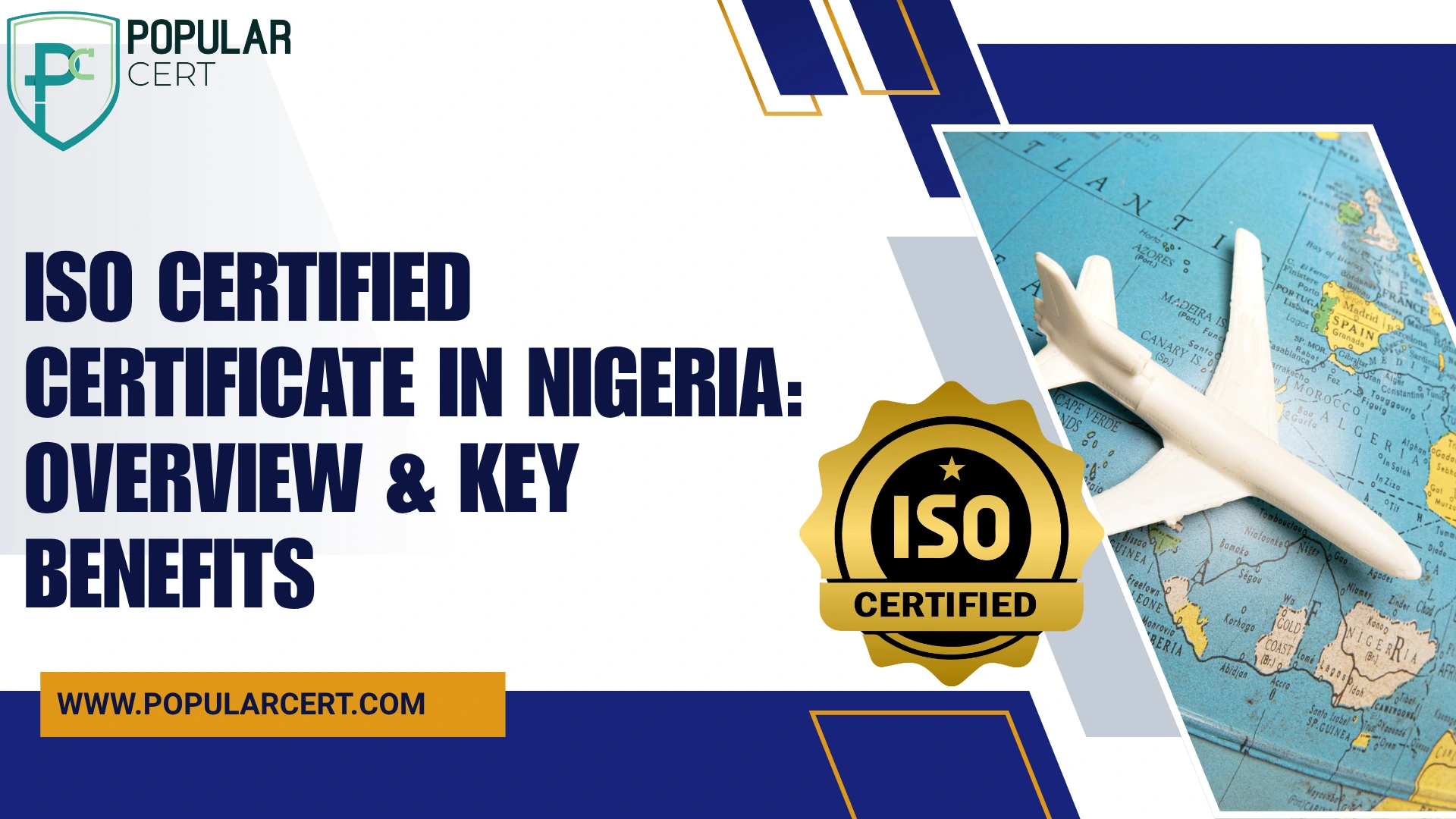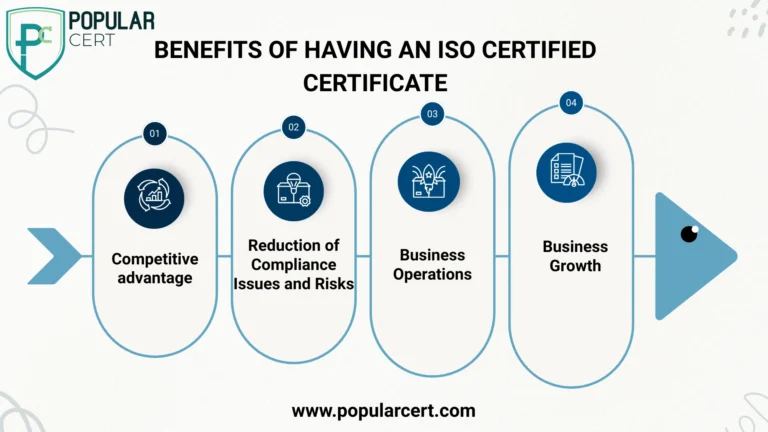ISO Certified Certificate in Nigeria: Overview and Key Benefits

Introduction
In the current landscape of doing business, trust, quality, and compliance are not simply words; they are vital for growth. One of the most reliable ways of showcasing trust, quality, and compliance is to obtain an ISO certified certificate in Nigeria.
For most businesses in Nigeria, ISO certification is not just a document but a testament that the organization complies with internationally accepted benchmarks for quality, safety, efficiency, or other vital operational areas. Whether you operate a small business or a multinational subsidiary, an ISO certified certificate can be a game changer in accessing new markets, enhancing credibility, and bolstering customer trust.
In this blog, we’ll discuss the most important elements including what an ISO certified certificate is, its advantages, the certification process in Nigeria, and how Popularcert can assist you in every step.
What Is an ISO Certified Certificate?
Definition and Purpose
An ISO certified certificate is awarded to organizations that are recognized for meeting compliance requirements of a certain standard set by the International Organization for Standardization (ISO). The areas of ISO standards are very diverse, and include quality management, environmental performance, food safety, information security, and occupational health.
The ISO certification does not have a universal template; it is influenced by your specific business circumstances and the sector you work in. Even though ISO develops the standards, the certification is granted by recognized bodies after a thorough auditing process.
Common ISO Standards in Nigeria
In Nigeria, businesses seem to be pursuing ISO certification for a variety of reasons—most of them being industry standards or customer expectations. These seem to be the most popular:
- ISO 9001 – Quality Management Systems (QMS) for maintaining service and product standards.
- ISO 14001 – Environmental Management Systems (EMS) for environmental sustainability and compliance.
- ISO 45001 – Occupational Health and Safety Management for the protection of workers.
- ISO 22000 – Food Safety Management Systems for safe food production and handling.
- ISO 27001 – Information Security Management Systems for protection of sensitive information.
Benefits of Having an ISO Certified Certificate

- Competitive advantage: The ISO certified certificate is a standout in a cluttered marketplace. With the ISO seal, it becomes easier to win and secure contracts and tenders. Your brand becomes associated with reliability, efficiency, and professionalism.
- Reduction of Compliance Issues and Risks: Many businesses require ISO Certification for intra-national and inter-national compliance eligibility. ISO Standards assists in differentiating risks, and planning preventative measures, as well as ensuring compliance with laws and regulations, hence reducing the chances for penalties and operational shudders.
- Business Operations: ISO Standards pay key attention to optimization and efficiency, therefore primarily focusing on Waste/Efficiency and Productivity Improvement. Compliance with these standards results in improved business performance without the usage of additional resources.
- Business Growth: ISO Certifications have global recognition. They enable Nigerian Industry Players to access international markets, engage with global partners and partake in cross-country business.
The ISO Certification Process in Nigeria
Types Of Certification
- ISO Certification
- ISO 9001 Certification
- ISO 14001 Certification
- ISO 45001 Certification
- ISO 22000 Certification
- ISO 27001 Certification
- ISO 17025 Certification
- ISO 13485 Certification
- ISO 20000-1 Certification
- ISO 22301 Certification
- ISO 50001 Certification
- ISO 37001 Certification
- IATF 16949 Certification
- ISO 29001 Certification
- ISO 31000 Certification
- ISO 20121 Certification
- ISO 10002 Certification
- ISO 41001 Certification
Get Free Consultation
Our Clients


















Step 1 – Internal Audit
As part of the ISO standard acquisition application procedure, undertake an internal audit against the standard to determine compliance functionality gaps as per the selected standard. This assists in understanding the gaps.
Step 2 – Corporate Strategy Formulation
Draft the relevant corporate strategies, business policies and operational tactics, and implement the plans. Ensure that employees are well trained and all operations, policies and strategies are aligned to ISO standards compliance.
Step 3 – Internal Audit
Internal audits are checks to see if your infrastructures are stil working as intended to with ISO Standards. Internal audits as a type of audit prepares your organization for any external audit by resolving any problems that may arise.
Step 4 – Certification Audit
The certification audit process is done by an accredited certification institution, in two parts:
Stage 1: Readiness assessment through documentation audit.
Stage 2: Implementation audit through actual site assessment.
Provided that all requirements are met, an ISO certified certificate is granted from the certification body.
Step 5 – Ongoing Surveillance Audits
Regular surveillance audits, often on an annual basis, protect the ISO certification by ensuring genuine adherence to standards and continual development as certification is no longer valid for life.
ISO Certification Requirements in Nigeria
To obtain certification, here are key requirements for Nigerian businesses:
- Comply with relevant policies and laws.
- Establish a management system according to the selected ISO standard.
- Document relevant processes and policies.
- Show evidence of executive’s active participation in ongoing improvement initiatives.
- Ensure relevant ISO compliant policies are adopted and implemented by the organization’s personnel.
Why Choose Popularcert for Your ISO Certified Certificate
For guiding Nigerian businesses to ISO Certified certification, Popularcert has become a name of trust. Here is a list of reasons:
- Local Expertise: Knowledge of Nigerian industries, their specific regulations, and the expectations of certification processes.
- Comprehensive Support: All steps from the first consultation to the certification are completed.
- Multi-Standard Capability: Providing assistance with ISO 9001, ISO 14001, ISO 45001, ISO 22000, ISO 27001, and more.
- Proven Track Record: Many businesses in Nigeria were assisted in obtaining certification and have successfully done so.
For Popularcert, certification is more than just passing an audit- it means building a system that enhances growth and drives sustained operational excellence.
Conclusion & Call to Action
A certificate in ISO audit is more than a certificate of compliance; it is a strategic tool that increases business value, enhances operational efficiency and access business growth opportunities. Whether it is meeting client expectations and demands, improving business processes, or expanding in the overseas market, Popularcert helps achieve business goals with the right ISO certification.
Whether you are a business in Nigeria looking for certification guidance or you want to achieve the certification in the highest operational standards, Popularcert is there to assist you throughout the certification journey.
To begin your journey towards excellence, make contact with Popularcert and start the ISO certification process.
GET A FREE CONSULTATION NOW
FAQs
What is the validity period for an ISO certified certificate?
Most ISO certified certificates are valid for a period of three years, during which time an annual surveillance audit is conducted to verify compliance.
Are small businesses in Nigeria Eligible for ISO Certification?
Yes, ISO certification is designed for businesses of all sizes, including SMEs. The implementing steps are what determines the processes to be put in place.
How long does ISO certification take in Nigeria?
It depends on your level of preparedness, the standard you opt for, and the complexity of your organization.
Is ISO certified internationally accepted?
Yes, without a doubt. ISO certificates issued by accredited bodies are accepted without borders and are beneficial in international trade.
Does Popularcert assist with re-certification?
Of course. Popularcert provides businesses with the necessary support and assessments to ensure they are ready to maintain and renew their ISO certified certificates, ensuring ongoing support and preparedness assessments.
